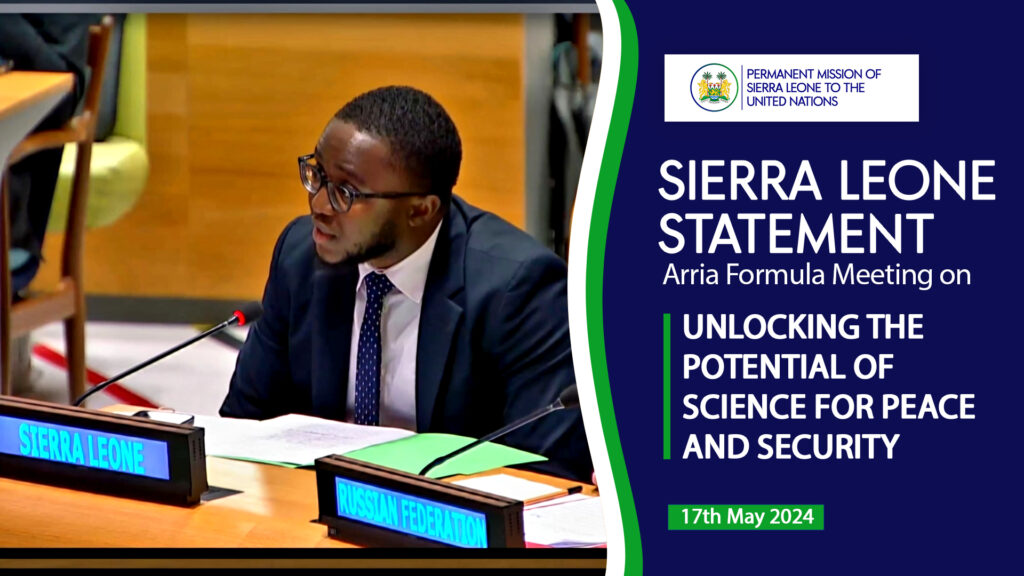BY
MR. SHAEKOU ALLIEU
MINISTER COUNSELLOR
Chair,
We thank the Mission of Switzerland for convening us today on this important topic.
We also thank Ms. Henrietta Fore, Dr. Sascha Langenbach, and Lieutenant General Mohan Subramanian for sharing their insights and recommendations.
At the closing session of the establishment of the United Nations in San Francisco, President Harry Truman’s statement that, “The UN Charter will not be poured into a fixed mold but would be adjusted in line with changing conditions” rings ever true, as the Un Security Council today adjusts and readjusts itself in finding solutions to complex and capricious conflict situations and geopolitical environments.
From the situations in the Middle East and Sudan, the conflict in Ukraine, to the multidimensional instability in the West Africa and the Sahel region, the Council must demonstrate its unequivocal commitment to upholding the principles of the UN Charter, advancing the values of human dignity and rights, ensuring international law compliance whilst employing more innovative, agile and flexible conflict prevention and resolution mechanisms.
Chair,
As the United Nations proceeds to develop a Pact of the Future that is responsive to the needs of people around the world, we can look to science and innovative technologies to support these efforts.
With this we would like to share three propositions the Council could consider in unlocking the potential of science in its work
Firstly, we must build trust in utilizing scientific tools. Consensus among Council members is a key metric for scientific trustworthiness. Consensus is vital on the usefulness of data and scientific evidence in supporting decision-making by the Council, as well as agreement on the normative framework, including the definition and characteristics of data and evidence, especially with regards to the credibility of the sources of data, its collection, collation, and analysis. Due consideration must also be given to its use by the Council, State and non-state actors around the world, as well as its storage and/or transformation to support knowledge management.
Council already uses data and evidence gleaned from a variety of sources and in a variety of ways as part of its decision-making processes and should therefore be disposed to guiding efforts to integrate appropriate complex data analysis mechanisms such as machine learning and AI technology into conflict prevention and peacekeeping operations. Additionally, we must also note that diversity in scientific expertise and perspectives would be the engine that would jaunt innovative responses to existing challenges.
Secondly, we must address multidimensional socio-economic and geopolitical challenges employing the unlocking potential of science. The complexities of today’s conflicts require that traditional conflict resolution models of diplomacy and negotiations be enhanced by nuanced and in-depth problem analysis and projections. Beyond the obvious uses of data science and machine learning in addressing climate related and other environmental challenges, these technologies have also shown great possibilities in optimizing public policy decision making by consolidating and analyzing relevant data from a wide range of heterogenous, structured, and unstructured sources. States should therefore commit to leveraging scientific knowledge in the context of policy making at national, regional and international levels.
Thirdly, Council must demonstrate responsibility in employing technological tools for policy. While the fourth industrial revolution presents unprecedented opportunities for increased pace, scope and output across sectors, it also requires regulations to ensure coherence with UN principles of human rights and dignity, fairness and accountability. There are legitimate concerns about the implications of digital systems for human rights, socio-economic development, principles of State sovereignty and equality. Whilst some member States are making progress in establishing fair play rules and regulations, the Council must also advocate for the UN to incorporate relevant regulations. Further the Council must support efforts, some already underway, at sectoral levels to prevent a widening of the socio-economic and geopolitical divide.
In closing, Chair, the Secretary-General’s recommendation on his New Agenda for Peace offers great promise for Council members on the potential of science on peace and security. Yes, science is a great enabler to build peace and resolve conflict around the world, but it is incumbent on the members of the Council to leverage its full potential in response to existing and emerging challenges.
Thank you!



